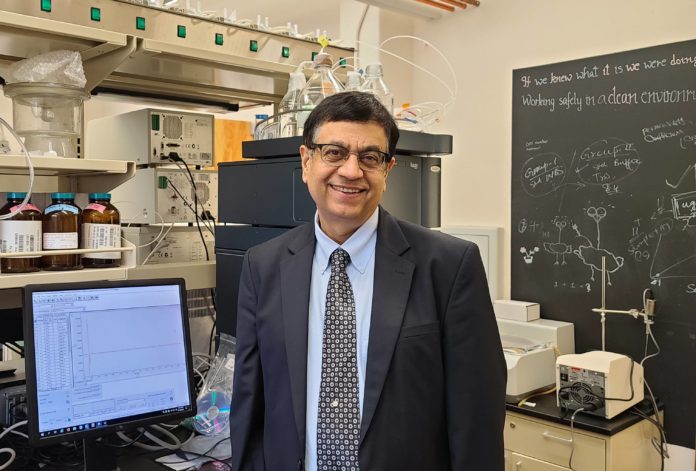ATLANTA–Mercer University College of Pharmacy’s Ajay Banga, Ph.D., has received funding from the National Institutes of Health CounterAct Program to develop topical treatments to help combat suffering and death from arsenicals-based chemical warfare agents.
Dr. Banga and his research team will develop topical spray and other formulations of 4-phenylbutyric acid, a compound used for the treatment of urea cycle disorders where ammonia builds up in the blood stream, and N-acetylcysteine, used to counteract acetaminophen overdose. His laboratory will test both compounds individually and in combination on skin from human cadavers. Decontamination studies also will be done in the Mercer lab using a surrogate arsenical agent.
The College’s subgrant, from the National Institute of Arthritis and Musculoskeletal and Skin Diseases, is $400,000 over five years.
Arsenicals-based chemical warfare agents, even at low concentrations, cause severe skin burns and at higher concentrations, can destroy a person’s respiratory tract and lead to death. Twelve developed countries, including the United States, agreed to dispose of many, but not all, of their chemical-based weapons by 2012, though chemical-based weapons have been used in recent years by governments in Syria and Sudan.
The study is in collaboration with Mohammad Athar, Ph.D., director, UAB Research Center of Excellence in Arsenicals, University of Alabama at Birmingham. Dr. Athar’s research team will perform animal studies with these compounds to assess efficacy.
Dr. Banga is co-director of the College’s Center for Drug Delivery Systems and is chair and professor of the Department of Pharmaceutical Sciences. His research interests are in traditional and non-traditional approaches for topical and transdermal delivery of pharmaceuticals and cosmeceuticals, especially for water soluble, small conventional molecules and macromolecules. His laboratory has received more than 80 funded projects in skin delivery system from industry, as well as federal funds.
About the College of Pharmacy
Mercer University’s College of Pharmacy is ranked the No.1 private pharmacy school in the Southeast, according to the 2016 and 2020 U.S. News & World Report. The college offers doctoral degrees in pharmacy (Pharm.D.) and pharmaceutical sciences (Ph.D.). Founded in 1903 as the independent Southern School of Pharmacy, the school merged with Mercer University in 1959 and in 1981 became the first school in the Southeast to offer the doctor of pharmacy degree as its sole professional degree. In 1988, the College launched its graduate program, offering the Ph.D. degree in pharmaceutical sciences. With an enrollment today of more than 500 students and a distinguished faculty of basic scientists and clinicians, the College of Pharmacy houses four centers focusing on research, teaching and learning. The college’s motto, “A Tradition of Excellence – A Legacy of Caring,” frames its philosophy of providing excellent academic programs in an environment where every student matters and every person counts. For more information about the college, visit pharmacy.mercer.edu










